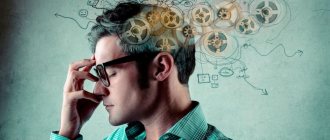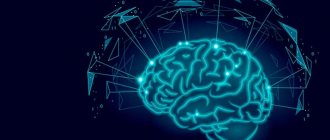Cognitive processes are a person’s ability to note events that occur, remember what needs to be done or bought, and listen to the interlocutor when he wants to tell something.
Cognitive processes
The text below will talk about what kinds of cognitive processes there are, what role they play in human learning, how mental direction processes can be improved, and much more.
What are cognitive or mental processes
The human brain is called upon to solve quite a lot of problems in different directions every day. Cognitive mental processes are those that are responsible for information processing of information that a person receives from the world around him. In other words, cognition is the knowledge of the environment, the person’s surroundings.
Mental psychological processes must interact harmoniously. This is necessary so that reality is adequately assessed by a person, then the response will be correct. This is why you can adapt to different life situations.
Mental processes are designed to interact with each other, but sometimes they occur separately. For example, some people whose speech is impaired, or whose memory does not perform its functions, solve math problems with ease and hear more sensitively. That is, if one function is disabled, the other continues to work.
What are cognitive processes
Cognitive impairments and disorders
The more a person engages in intellectual development, the more connections appear between neurons, which, in turn, also develop. This creates cognitive reserve .
If one part of the brain stops working adequately due to injury or aging, then another will take over responsibility (what is it?) for performing important functions.
An experiment was conducted at Harvard where 824 people were observed over many years. They were of different levels of education, social security and intellectual development.
The result showed that people who actively developed their cognitive abilities were able to think logically in old age, remembered the smallest details, and behaved adequately.
Cognitive disorders are possible for the following reasons:
- injury;
- infectious diseases of the brain itself (meningitis);
- infectious diseases of other systems, in which toxins are released and cells of the nervous system are damaged (syphilis);
- oncological formations;
- diabetes;
- stroke;
- mental illness (schizophrenia);
- aging.
Depending on what caused the dysfunction, there will be different symptoms and cognitive deficits. Let's look at the example of senile and vascular dementia.
Dementia that appears after age 65 is called Alzheimer's disease . The main symptom is the development of forgetfulness. Subsequently, memory deterioration progresses to the point that a person may not remember his name or where he lives. Problems with orientation in space also begin. Therefore, such patients require constant supervision.
Speech is impaired. It is difficult for a person to pronounce words and repeats them. Then there are problems with logical thinking, which are also noticeable when talking with the patient. They become embittered by everything around them, very sensitive and whiny.
Vascular dementia develops due to insufficient blood circulation in the brain, ischemia, and strokes. Memory impairment does not come to the fore as in Alzheimer's. A decrease in attention and concentration is immediately noticeable. Patients have difficulty identifying similarities and differences between objects, slow thinking, and difficulty pronouncing words.
Treatment is prescribed only after a thorough diagnosis of the cause. If this is a consequence of diseases such as infectious diseases, cancer, diabetes, then therapy is aimed at eliminating or correcting the underlying disease.
For Alzheimer's disease, acetylcholinesterase inhibitors are used. In case of vascular disorders, the attention of doctors is aimed at improving blood circulation: phosphodiesterase inhibitors, calcium channel blockers, a2-adrenergic receptor blockers.
In order to improve the state of intelligence in diseases, drugs with metabolic and antioxidant properties are often used. Experiments have also proven the positive effect of nootropics. But it is worth remembering that they only help when there is a problem. Does not improve cognitive abilities in healthy people.
What sciences study these processes?
There are quite a lot of sciences that study cognitive processes in psychology. This list includes neuroscience, philosophy, sociology, anthropology and linguistics. A large number of works, term papers and dissertations have been written on this issue.
Mechanical memory - what is it in psychology and how is it characterized?
Scientists from various scientific fields more than fifty years ago with their research contributed to a revolution in the issue of cognitive research. Because of this, mental processes began to be studied in even more depth.
For your information. In modern days, cognitive processes lend themselves to very global study, and the knowledge that can be obtained is successfully used in marketing and psychotherapy.
How does learning happen? [edit]
Cognitive theory mainly emphasizes the acquisition of knowledge and the growth of mental structure. Cognitive theory tends to focus on conceptualizing the student learning process: how information is acquired; how information is processed and organized into an existing schema; how information is retrieved during recall. In other words, cognitive theory attempts to explain the process of acquiring knowledge and the subsequent effects on mental structures within the mind. Learning is not the mechanics of what the learner does, but a process dependent on what the learner already knows (existing information) and their method of acquiring new knowledge (how they integrate new information into their existing schemas). The acquisition of knowledge is an activity consisting of the internal codification of mental structures in the mind of the student. According to the theory, the student should be an active participant in his own learning process. Cognitive approaches mainly focus on the learner's mental activities, such as mental planning, goal setting, and organizational strategies (Shell, 1980). In cognitive theories, it is not only environmental factors and learning components that play an important role in learning. There are additional key elements such as learning to program, transform, rehearse, store and retrieve information. The learning process involves the learner's thoughts, beliefs, and attitudes (Winna, 1988). [9]
Types of cognitive processes
Low or basic
Sensation and perception
Determination - what is it in psychology
A sensation is something that is formed under the action of various stimuli, as well as the determination of signals from a person’s environment. He accepts them with the help of his feelings. This is how information is acquired from the environment around you. Data comes from the outside world, and sometimes from the human body. The process of perceiving a basic type includes some interpretation of the information received.
Attention! There is plenty of information around, yet each person has the ability, having received many different signal stimuli, to pay attention to what is really interesting to her. Some actions do not require attention. This is, for example, moving or chewing food. Others require attention without fail, such as speech or body language.
Some processes that are repeated often in life are done automatically. When learning to drive a car, it is difficult to immediately act in a coordinated manner, but then less and less effort is put in, as automaticity develops.
About memory
Human memory stores answers to a fairly large number of different questions. It encrypts data, it is able to save it, and then restore it if necessary. The classification of types of memory is as follows:
- Memory is short or short-term;
- Sensory type memory;
- Semantic type memory;
- Working memory;
- Autobiographical memory and others.
All of these species are capable of interacting or not. For example, if a person with amnesia remembers where he needs to go today, he may forget the name of his closest relative.
Attention and memory
Processes are complex and higher
Intelligence or mind
This concept means an ability that gives an individual the ability to solve a variety of problems. Some scientists have popularized in society the theory that there is no intelligence, but only different abilities that are used according to the situation or activity.
On a note. In order to skillfully deal with different circumstances in everyday life, many researchers emphasize the importance of emotional intelligence.
Thinking
Human thoughts are complex and heterogeneous. This process is necessary in order to make decisions, reason, solve problems, and think creatively.
In order to make these functions somewhat simpler, the human brain creates judgments and inferences. In order for mental processes to speed up, it is necessary to group events, people, objects, and so on.
Often people use shortcuts to make the thought process happen faster, and do not process information in general. In this case, there is some deviation from normal reasoning. For example, when someone thinks that they can predict the ending of a game in advance.
Speech
Speech is a complement to body language. With its help, you can reproduce entire words and sentences, use their combinations, the main thing is to give an outlet to emotions, feelings and attitudes towards the situation.
Speech can develop throughout life. Everyone's communication skills are different and can be improved with practice. When speech impairments are present, communication becomes difficult, but these impairments can be corrected with proper attention.
Thinking and speech
How to develop cognitive thinking
Immediately after birth, the child begins to perceive and explore the world. But he does this at his own level, depending on his age and whether his parents work with him.
There are the following types of cognitive thinking:
- Visual and effective (up to 3 years) - the child looks at everything around him, touches it, sometimes even tries to lick it. That is, it uses all the simplest ways to find out about the objects around it. The role of mom and dad at this stage is to show the child various interesting objects, name them, tell them in an accessible language about their properties and method of use, and let them study it themselves.
- Visual-figurative (up to 7 years) – the child learns to complete assigned tasks and solve problems using logic. Parents should play educational games with him for fine motor skills, memory, attention and imagination. Also teach rules of behavior, which also develops cognitive thinking.
- Abstract (after 7) - the student learns to understand and imagine abstract things (what is this?) that cannot be seen or touched.
But what should an adult do? Is the current level of development of memory or thinking really the limit ? No, even at 40 or 60 years old you can continue to work on your cognitive abilities.
The love of learning about the world around us and ourselves contributes to the improvement of these brain functions.
Some recommendations that are directly aimed at developing thinking :
- Learn a foreign language.
- Choose a different road to get to work or school.
- Do familiar things with your other hand (for right-handed people - left, for left-handed people - right).
- Do crossword puzzles.
- Draw even if you don't know how. Make it more difficult: take the pencils in both hands and continue to draw something.
- Say different words out loud or silently in reverse.
- If you need to calculate simple equations, do it in your head, without the help of a calculator or paper.
- In order to train your memory, before going to bed, you need to remember in detail how the whole day went. You can also reproduce an autobiography from childhood. Or in reverse order: from today until the moment they crawled on the floor for a toy. You can remember either simply in your head, or by telling someone, or writing it down in a notebook.
- Watch various films and read books, of course.
- There are many applications on our smartphones that are directly aimed at developing certain cognitive functions.
Functional diagram of the cognitive process
Long-term memory - what does it mean in psychology, how to improve it
This scheme is used to specify the cognitive process and consists of the following blocks:
- Initial information analysis, that is, the receptor area;
- That which concerns perception: hearing, sight, smell, taste, and so on;
- Memory is like a storage facility, which is quite complex. It contains knowledge and information;
- The area of representation. This is where the synthesis of perception occurs.
Development of cognitive abilities
The human brain, as a structure of interacting neurons, is very plastic and adapts to changes in external conditions and to the goals that its owner sets for himself.
If you set a goal, then regular training can lead to truly impressive results. You can act in standard ways, for example, learning long poems by heart or solving mathematical problems, or you can combine familiar methods with original ones.
Application of cognitive processes in education
When receiving education in the classroom, a person is constantly faced with activities that test knowledge and abilities. There are a sufficient number of learning theories, but almost all take into account mental processes.
When reading, a person recognizes letters, recalls words, and compares them with what he already knows. He can process the information received in different ways. It depends on what you need to get in the end: prepare for an exam, just find a passage, and so on.
When writing, much the same thing happens. You need to not be distracted by extraneous stimuli, pay attention to the quality of what is written, do not neglect spelling, etc.
Improvement of mental processes
Cognitive distortions (dissonance)
Cognitive dissonance is not just a fancy phrase that only applies to scientists and professors. We ourselves often encounter this .
This is a state in which contradictions arise:
- knowledge;
- opinions;
- beliefs.
During a cognitive distortion, a person experiences confusion, anxiety, awkwardness, stress, feelings of shame and guilt, or even anger - psychological discomfort . For example, there is a beggar sitting in a pedestrian crossing to whom you gave some money. She reaches for them, and an expensive watch is shown on her hand.
You are confused at first because you thought the person needed financial support. But it turns out that he may be richer than you yourself. At first you find yourself in a stupor, which can then turn into aggression because you have been fooled.
Dissonance (what is it?) arises for the following reasons :
- the discrepancy between a person’s knowledge of an object, phenomenon, other people and really what they are;
- discrepancy between the acquired experience and the situation that was repeated, only in a different way;
- discrepancy between personal opinion and the point of view of others, which pops up randomly;
- maintaining traditions and beliefs, if you yourself do not sincerely respect and believe them;
- logical inconsistency of facts.
What to do if this strange cognitive dissonance happens to you? First you need to reduce the significance of this condition. After all, there is an explanation for everything that is simply not available to you at the moment.
To do this, you need to look for new information about the subject of cognitive distortion . Study it in more detail, or talk about it with other people. Perhaps you just had a small piece of knowledge and this was a great opportunity to expand it.
You shouldn't have very constrained beliefs . You must absorb and notice information of various formats, study everything around you. With this approach to life, it is unlikely that anything will surprise or greatly offend. You will simply stumble upon new knowledge that you will immediately take note of.
Ways to improve
Cognitive development can be improved and trained throughout your life. To do this you need:
- Take care of health, which means a lot and is directly related to cognitive processes;
- Use technological advances such as intelligence games. They allow brain testing;
- Celebrate your successes;
- Develop critical thinking;
- Read.
All the processes described can indeed be significantly improved, and this is not too difficult to achieve with proper attention and practice.
Attention[edit]
Attention is the first part of cognitive development. It refers to a person's ability to focus and maintain concentration. [4] Attention can also be related to how focused and fully focused a person is on one thing. [5] It differs from other temperamental characteristics such as persistence and distractibility in the sense that the latter modulates a person's daily interactions with the environment. [4] Attention, on the other hand, involves its behavior when performing certain tasks. [4]For example, learning occurs when the student pays attention to the teacher. Interest and effort are closely related to attention. Attention is an active process that involves numerous external stimuli. The body's attention is attracted to three concentric circles at any given time; beyond awareness, boundaries and focus. [6] It's important to note that humans have mental abilities, so there are only so many things we can focus on at once.
A theory of cognitive development called information processing states that memory and attention are the basis of cognition. It is assumed that children's attention is initially selective and based on situations that are important to their goals. [7] This ability increases as the child gets older because he or she is better able to perceive task stimuli. [7] Another conceptualization classifies attention into mental attention and perceptual attention. The former is described as executive-driven "brain energy" attention that activates task-relevant brain processes, and the latter is immediate or spontaneous attention driven by new perceptual experiences. [8]
Links[edit]
- Mandler, G. (2002). Origins of cognitive(r)evolution. Journal of the History of Behavioral Sciences, 38, 339-353
- ^ ab Lilienfeld, S.; Lynn, S. J.; Namy, L.; Woolf, N. (2010), Psychology: Foundations of Everyday Thinking
, Pearson, pp. 24–28, ISBN. 978-0-205-65048-4 - General Psychology
(first edition, 2004 ed.). Neelkamal. paragraph 60. - ^ a b c Siegel, L.S.; Morrison, F.J. (December 6, 2012). Cognitive development in atypical children: Progress in cognitive development research. Springer Science & Business Media. ISBN 9781461250364.
- Friedrich, Francis (2019-06-28), "7.2 Attention", Introduction to Psychology
, University of Saskatchewan Open Press, retrieved 2021-03-18. - General Psychology
(first edition, 2004 ed.). Neelkamal. paragraph 59. - ^ a b Pendergast, Donna; Main, Catherine (01/07/2019). Teaching in Primary Schools: Rethinking Curriculum, Pedagogy and Assessment. Allen and Unwin. ISBN 9781760870362.
- Barrouillet, Pierre; Gaillard, Vincian (December 21, 2010). Cognitive development and working memory: A dialogue between neo-Piagetian theories and cognitive approaches. Psychology Press. ISBN 9781136930058.
- "Psychology" (PDF).
- "Teaching Cognitivism".
- "Theories of Learning".
- "Cognitivism Learning and Cognition". Quote journal requires |journal=(help)
- "Cognitivism, psychological glossary, needs, degrees, research, human psychology, articles, approaches, concepts, consciousness". www.psychegames.com
. Retrieved January 29, 2021. - "Components of Cognitive Theory: A Study Guide for the Sciences". canvas.vt.edu
. Retrieved May 15, 2021. - "Cognitivism, psychological glossary, needs, degrees, research, human psychology, articles, approaches, concepts, consciousness". www.psychegames.com
. Retrieved January 29, 2021. - "The Chinese Room Argument", SpringerReference
, Springer-Verlag, 2011, DOI: 10.1007/springerreference_114539
Theoretical approach[edit]
Cognitivism consists of two main components: methodological and theoretical. Methodologically, cognitivism has a positivist approach and says that psychology can (in principle) be fully explained using the scientific method, there is speculation as to whether this is true or not. [13] This is also a largely reductionist goal, suggesting that the individual components of mental function ("cognitive architecture") can be identified and meaningfully understood. [14] The second says that cognition contains discrete and internal mental states (representations or symbols) that can be changed by rules or algorithms. [15]
Cognitivism became a dominant force in psychology in the late 20th century, replacing behaviorism as the most popular paradigm for understanding mental function. Cognitive psychology is not a complete refutation of behaviorism, but rather an extension that recognizes the existence of mental states. This was due to increased criticism towards the end of the 1950s of simplified teaching models. One of the most notable criticisms has been Noam Chomsky's argument that language cannot be acquired solely through conditioning and must be at least partially explained by the existence of internal mental states.
The main questions that interest cognitive psychologists are the internal mechanisms of human thinking and the processes of cognition. Cognitive psychologists have attempted to shed light on the supposed mental structures that are causally related to our physical actions.
See also[edit]
- Cognition - the action or process of knowing
- Cognitive psychology - Branch of psychology
- Cognitive revolution
- Cognitive science is the interdisciplinary scientific study of the mind and its processes.
- Computational theory of mind - Family of views in philosophy of mind
- Consciousness - The feeling or awareness of internal or external existence.
- Critical psychology
- Educational psychology is a branch of psychology concerned with the scientific study of human learning.
- Enactivism is a philosophical concept
- List of important publications in psychology § Cognitive psychology
- Mentalism (psychology)
- Phenomenology - philosophical method and school of philosophy
- Postcognitivism
- Symbol Grounding Problem
What types of learning are explained in detail by this position? [edit]
Cognitive theory primarily explains complex forms of learning in terms of reasoning, problem solving, and information processing (Schunk, 1991). Emphasis should be placed on the fact that the goal of all the above-mentioned perspectives is considered to be the same - imparting knowledge to the student in the most effective and efficient manner (Bednar et al., 1991). Simplification and standardization are two methods used to improve the efficiency and effectiveness of knowledge transfer. Knowledge can be analyzed, decomposed and simplified into basic building blocks. There is a correlation with the behaviorist model of the knowledge transfer environment. Cognitive scientists emphasize the importance of effective processing strategies. [12]
Criticism of psychological cognitivism[edit]
| This section requires additional links for verification . |
In the 1990s, various new theories emerged to challenge cognitivism and the idea that thinking can best be described as computation. Some of these new approaches, often influenced by phenomenological and postmodern philosophy, include situated cognition, distributed cognition, dynamism, embodied cognition. Some thinkers working in the field of artificial life (for example, Rodney Brooks) have also created non-cognitivist models of cognition. On the other hand, much of early cognitive psychology and the work of many current cognitive psychologists do not view cognitive processes as computational. The idea that mental functions can be described as patterns of information processing has been criticized by philosopher John Searle and mathematician Roger Penrose, who argued that computation has some inherent shortcomings that cannot capture the basis of mental processes.
- Penrose uses Gödel's incompleteness theorem (which states that there are mathematical truths that can never be proven in a sufficiently strong mathematical system; any sufficiently strong system of axioms will also be incomplete) and the Turing stopping problem (which states that there are some things that cannot be proven. inherently incomputable) as proof of his position.
- Searle developed two arguments. The first (well known from his Chinese room thought experiment) is the "syntax is not semantics" argument, that is, a program is just syntax, and understanding requires semantics; therefore programs (hence cognitivism) cannot explain understanding. Such an argument presupposes the controversial notion of a private language. The second, now favored by Searle but less well known, is his “syntax is not physics” argument: nothing in the world is inherently a computer program except the one that is used, described, or interpreted by the observer, so either everything can be described as a computer and, to put it simply, the brain can, but then this does not explain any specific mental processes, or there is nothing internal to the brain that would make it a computer (program). Many oppose these views and criticize his arguments, which has caused significant controversy. [16] Both points, Searle argues, refute cognitivism.
Another argument against cognitivism is Ryle's regress problem or homunculus fallacy. Cognitive scientists have advanced a number of arguments to try to refute these attacks. [ clarification needed
]
What is the role of memory? [edit]
Memory plays a vital role in the learning process. Information is stored in memory in an organized and meaningful way. Here the teacher and designers play different roles in the learning process. Teachers are expected to facilitate learning and organize information in an optimal manner. While designers presumably use advanced techniques (such as analogies and hierarchical relationships) to help students gain new information to add to their previous knowledge. Forgetting is described as the inability to retrieve information from memory. Memory loss may be a mechanism used to discard information that is not relevant to a situation by assessing the relevance of newly acquired information. [10]










